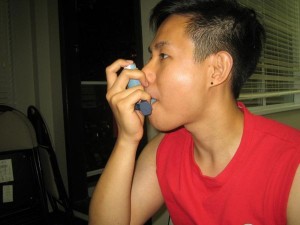It is important to note that asthma attacks can be deadly. Once the right asthma treatment is used, the risk of ending up with an asthma attack is reduced. A doctor should be consulted at least once a year for a check-up as well as discuss suitable treatment options.
How do I know if it is an asthma attack?
You can distinguish if an individual is having an asthma attack if:
- The reliever inhaler is not effective
- Individual is breathless when speaking, sleeping or eat
- The symptoms are becoming worse
- Children can complain of a stomachache
Oftentimes, using a reliever inhaler is enough to manage the symptoms when starting to experience an attack. In some cases, the symptoms can become severe and immediate action is required. If the individual is required to be admitted to the hospital, take note of the medications used if possible.

Measures to do during if an individual has an asthma attack
- Take 1-2 puff of the reliever inhaler right away
- Instruct the individual to sit down and perform slow, steady breaths
- If the individual starts to recover, he/she must take 2 puffs from the inhaler every 2 minutes. The individual can take in 10 puffs.
- If the individual does not feel any good after using the inhaler or if you are concerned, call for emergency assistance. In case the ambulance does not arrive within 10 minutes and the individual still feels unwell, he/she must take 2 puffs every 2 minutes.
If the symptoms improve and there is no need to call emergency assistance, it is recommended to consult a doctor within 24 hours.
What to do after an attack
It is recommended to set an appointment with a doctor within 48 hours after the attack. A doctor should be consulted regarding any changes that might be required to manage the condition safely.
In case the individual has an attack or there is a need to utilize a reliever inhaler on a regular basis, set an appointment with a doctor. Take note that the dosage of the preventative treatment might require adjustment.
How to prevent asthma attacks
Many individuals who end up with asthma attacks might have warning signs during the initial days before the attack.
There is a need to use the blue inhaler more often, changes in the peak flow readings and increased symptoms such a waking up at night. These warning signs should not be ignored since they indicate that asthma control is poor and there is a risk for a severe attack.
The individual should follow the personal action plan. In case the symptoms continue to become worse, set an appointment with a doctor.
Family and friends should be prepared to help in case of an emergency. It is vital to learn to recognize an asthma attack and what to do during such cases. This includes assisting the individual to sit up in a comfortable manner, calming him/her, helping use the reliever treatment as well as calling for help if the condition does not seem to improve.
